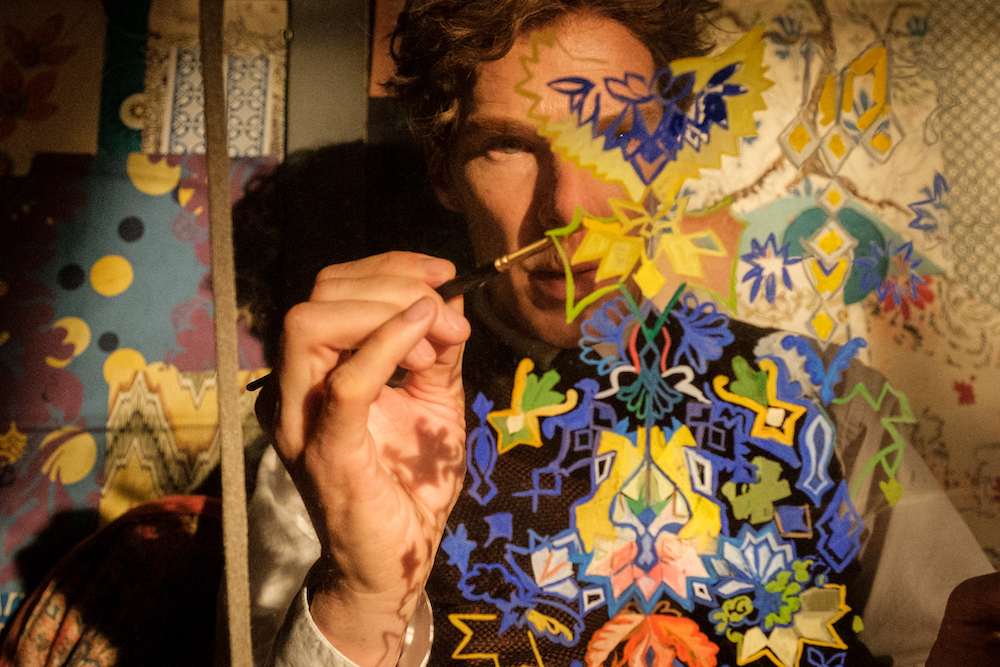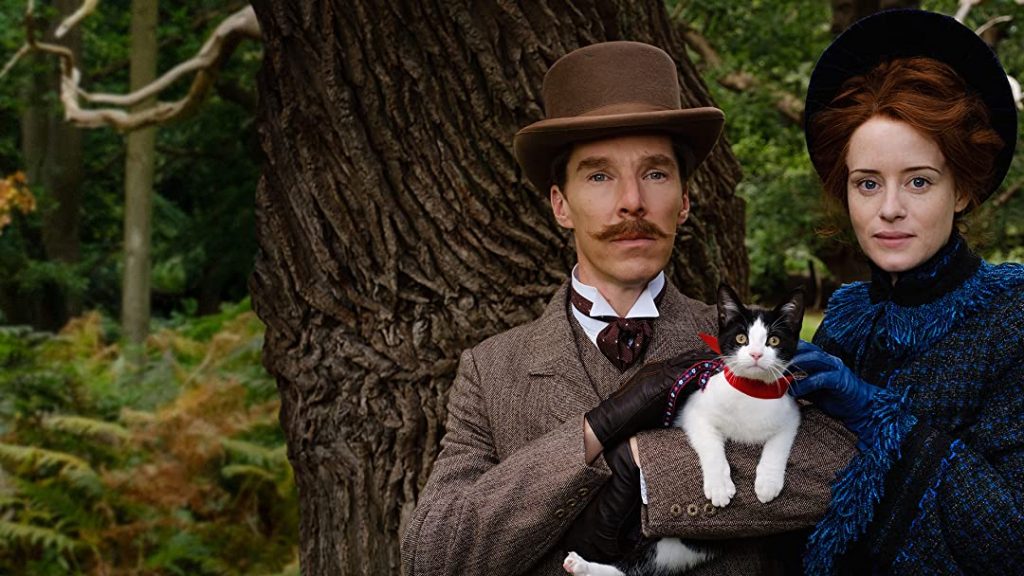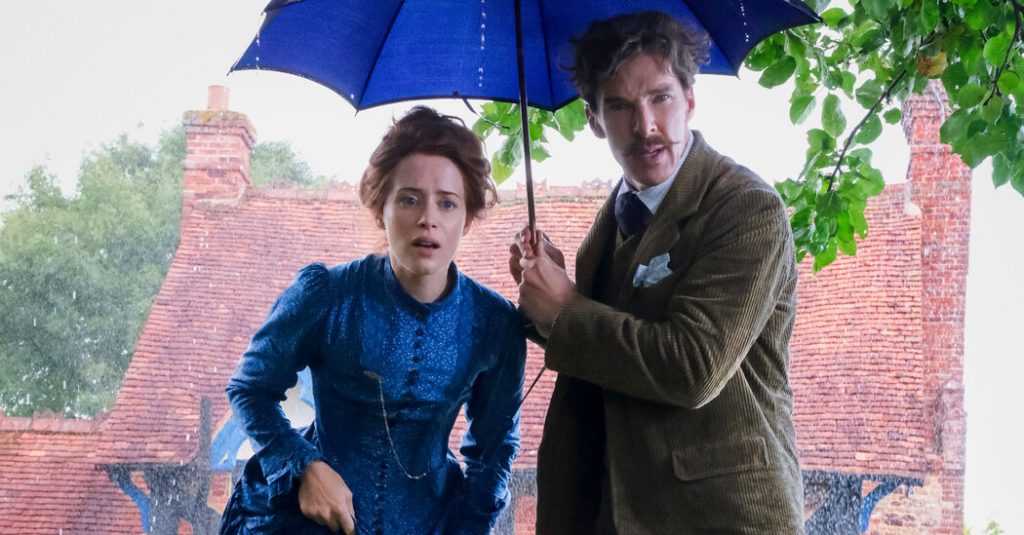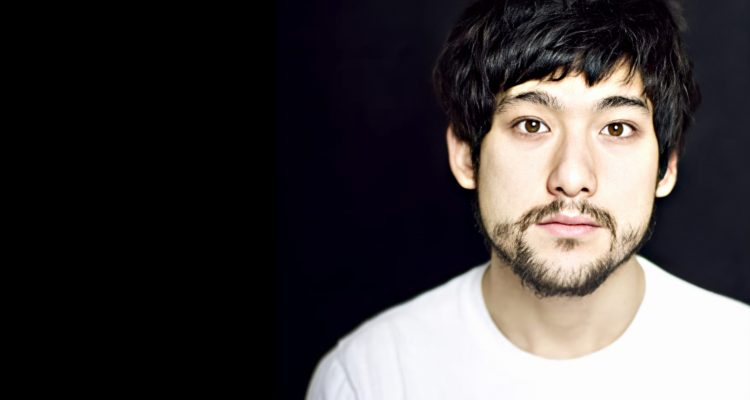In “The Electrical Life of Louis Wain,” director Will Sharpe finds a kinetic energy to tenderly and empathically visualize the experience of an odd yet brilliant artist.
The beautiful and tragic biopic, which Sharpe co-wrote with Simon Stephenson, is inspired by the life of Louis Wain, a tortured British genius, played by Benedict Cumberbatch, who found fame in the late 19th century through his psychedelic drawings of cats.
Premiering at the Toronto Film Festival, the film illustrates Louis’ chaotic life with a bounding, colorful force that portrays the electricity of the artists’ over-stimulated mind and worldview. Boasting luscious set designs and blending Louis’ fanatical mind with the struggles of mental illness, Louis Wain also stars Claire Foy, Andrea Riseborough, and Toby Jones. It’s a bountiful journey that showcases Louis’ brilliant drawings alongside the tragedies he faced throughout his life.
“There’s a suggestion that part of Louis’ energy might be trying to overcome a very overactive mind and imagination,” Sharpe notes. “I was really keen to understand him as a human being and get under his skin into his mind.”
Sharpe spoke with Awards Focus about collaborating with Benedict Cumberbatch, developing a melancholic, modern score with composer Arthur Sharpe, and tapping into the electricity of Louis’ mind through visual storytelling.
Awards Focus: Were you surprised with how the film has connected with audiences in such a strong way?
Will Sharpe: It’s always a strange, beautiful time when you let go of a project. We finished (The Electrical Life of Louis Wain) a while ago and have been waiting to release it into cinemas because that’s what we made it for. It’s such a sensory film and to pay due aspects of his life, it’s been nice to see how it’s been received and I’m grateful to have the film out there.

AF: Can you talk a bit how the film came together, and how Benedict Cumberbatch came into the project?
Sharpe: We hadn’t actually been searching for something to collaborate on. Initially, it was brought to us by Benedict’s company Sunny March, and producers I had met before but had not worked with together. As soon as Benedict and I started talking about this project I could see he had a real passion for it too. We were absolutely on the same page about telling the story as ethically as we could, and the more I read about Louis Wain’s life the more I found this to be genuinely inspiring. He was a heroic figure and I found his life to be truly remarkable.
AF: Louis had a lot of passions, from boxing to writing, drawing, and composing. Could you connect with that yourself having many creative outlets to draw upon?
Sharpe: What felt important about that period in Louis Wain’s life was that he was still working out what he wanted to be. He was full of energy and full of ideas, and there’s a suggestion that part of that might be trying to overcome a very overactive mind and imagination. As we see in the movie for somebody struggling with mental illness, I was really keen to understand him as a human being and get under his skin into his mind.
The reality of the story is that he really had this relationship as a result of which was outcasted by his family. Emily, his wife, really was terminally diagnosed with cancer and they adopted a kitten when it was a really strange time to do, and it brought them a lot of comfort and warmth at a difficult time. Before all that, he was searching for his destiny, and while I don’t box I do spend most of my time with my family.
Actually, I don’t want to give you the impression I’m good at surfing, because that’s something I’ve only done twice in my life, but I really loved it particularly as a release. I love the ocean and swimming and I always feel calm when I’m underwater in the ocean. It feels like it shuts off the noise of life somehow. I feel like there are parallels between surfing and the creative process where you have to get everything technically, absolutely right because you’re at the mercy of much greater power, and there’s no guarantee that even if you do everything technically correctly, 95% of the time is getting the shit kicked out of you. The 5% of the time where it works out is so exhilarating that you want to do it again immediately.

AF: The speed of Louis’ work is incredible and well highlighted in the film. Was that a creative decision to highlight Louis’ dexterity in the film?
Sharpe: It was something he was known for, and Benedict was very keen to perfect the 200 drawing techniques that Louis Wain was quite well known for so that we could get it in-camera without too much struggle. It was almost a reluctance in a sense. He experimented with other things like he taught music for a bit and wanted to be a composer. He taught art to school children but he was a terrible teacher. He was an absolute polymath. But the reason he kept getting work as an illustrator was partly because he was so fast.
AF: The film is really a mastery of blending tones, and the production value in the score really encapsulates this beautiful world. It feels like a masterpiece. Can you talk a bit about the score and working with Arthur Sharpe?
Sharpe: Arthur and I had worked together before, and we often work closely. He always starts early sending ideas during script development so by the time we’re in the edit we have this back and forth. He knew I wanted, with the world of the film, for this movie to have an awareness of the period but, as with the language the characters use and their physicality, that we wanted to have a slightly modern edge too.
It was important to have the elements of the score carrying some of the scale and emotional aspects of the story, that the instruments carried the electricity. That comes from rendering this idea that Louis Wain was convinced there was some force in the ether that was key to understanding why sometimes he felt so out of sort, and other times he felt so wonderful. Arthur knew this early on and he wanted to create this synthesizer for the base score and find a more organic, human, and natural way of creating that feeling of electricity.

AF: Visually, the film also incorporates the electricity and has an almost fairytale quality to the aesthetic.
Sharpe: Exactly. One of the key things we wanted to try was to bring the audience into his headspace. We were always trying to understand as best we could what it was like to be him. Some of that is achieved through how we shot it, like the traumatic journey he has from New York to the UK and this recurring nightmare he has as a child. We tried to do as much as we could in-camera using back projection and low frame rates, photography style, to give it a slightly psychological feeling. Other times we process it very cleanly to give an electrical, romantic feeling. I was so very lucky to work with some extraordinary people. I try the cast and crew as closely knit as possible, cross-pollinating ideas about visuals and music.
AF: What’s next for you and are there any upcoming projects you’re excited for audiences to see?
Sharpe: Well, I went straight on to do the new HBO limited series Landscapers starring Olivia Colman and David Thewlis right after Louis Wain, so I have a few more days of post-production on that. Then I need to take a little break because we have a baby coming very soon. I will be taking some time off to reflect.
This article was co-written by Matthew Koss.


